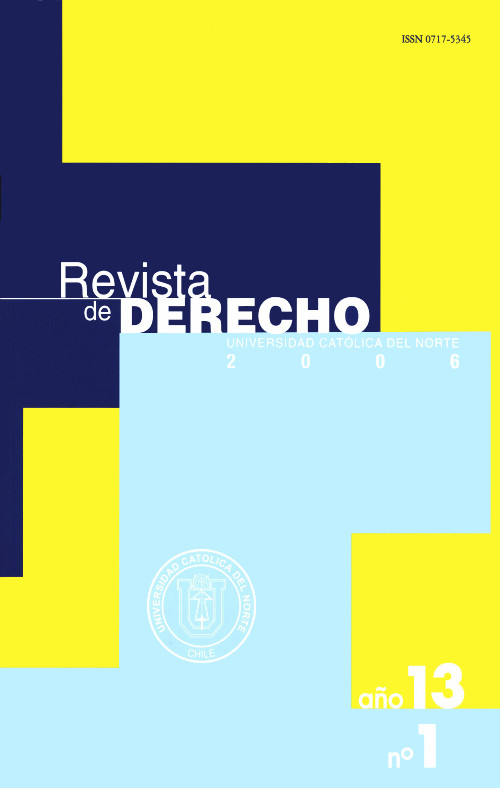Formas de fundamentar la unidad política.: La recepción de Aristóteles por Tomás de Aquino frente a San Agustín y al agustinismo
Published 2006-06-30
Keywords
- State,
- Basis,
- Justification,
- Aristotle,
- Thomas Aquinas
- Kant,
- Augustine of Hippo ...More
How to Cite
Abstract
This article seeks to approach a highly discussed, central Philosophical-Political issue: the problem of the basis or the justification of the State. The State -or political unity- does not carry out tasks supported only in persuasion and affection; the force is also an esential means for its action. The question about the justification of the State allows two answers: the one that denies the possibility of justification (anarchism and marxism) and the one that accepts the possibility of justification. Among the last one it's possible to distinguish a "negative" justification, that shows how can the State overcome the situation of prestate disorder, and a "positive" justification, that emphasizes the goodness of community lije that is reached in the polis or political unity. The article shows the insufficiency exposed by the anarchist and marxist denial of the State. Later the two modes of justification are basically approached, within highty relevant authors for the history ofpolitical philosophy: Aristotle, Augustine of Hippo, Thomas Aquinas, and Kant. In short, the article attempts to show that, well understood, the "positive" basis of the political unity allows the overcoming of those problems that the "negative" (basis) leaves unresolved.
Downloads
References
ARISTÓTELES: Política.
ARQUILLIÈRE, Henry Xavier: El agustinismo político. Ensayo sobre la formación de las teorías políticas en la Edad Media, Ed. Universidad de Granada, Granada, 2005.
BAKUNIN, Michael: Prinzipien und Organisation der Internationalen Revolutionären Gesellschaft, en: Gesammelte Werke, Berlín, 1975, Tomo III.
BLACK, Anthony: El pensamiento político en Europa, 1250-1450, Cambridge University Press, 1996.
CRAEMER-RUEGENBERG, Ingrid: Alberto Magno, Herder, Barcelona, 1985.
DIEFENBACHER, Hans: Anarchismus-die verlorene Utopie?, en: H. Diefenbacher (ed.): Anarchismus. Zur Geschichte und Idee der herrschaftsfreien Gesetlschaft, Darmstadt, 1996.
DUNBABIN, Jean: "The reception and interpretation of Aristotle's Politics", en: Norman Kretzmann y otros, The Cambridge History of Later Medieval Philosophy, Cambridge University Press, 1982.
FLÓREZ, Ramiro: "Los presupuestos del agustinismo político medieval", en Actas del II Congreso de Filosofía Medieval, Sociedad de Filosofía Medieval, Zaragoza, 1996.
GILSON, Etienne: La Filosofía en la Edad Media: desde los orígenes patrísticos hasta el fin del siglo XIV. Gredos. Madrid 1976.
GÓMEZ PÉREZ, Rafael: La ley eterna en la historia: sociedad y derecho según san Agustín, Eunsa, Pamplona, 1972.
HERRERA, Hugo: Sein und Staat. Die ontologische Begründung der politischen Praxis bei Helmut Kuhn, Königshausen & Neumann, Würzburg, 2005.
_______: "Das Denken Carl Schmitt und die 'klassische' politische Philosophie", en: Staat und Politik, Nomos, Baden-Baden, 2003.
KANT, I.: "Über den Gemeinspruch: Das mag in der Theorie richtig sein, taugt aber nicht für die Praxis", en: Akademieausgabe, tomo VIII.
___: "Metaphysische Anfangsgründe der Rechtslehre", en: Akademieausgabe, tomo VI, § B.
___: Vom Ewigen Frieden, Ed. Karl VorHinder, Leipzig, 1919.
KLUXEN-PYTA, Donate: Nation und Ethos. Die Moral des Patriotismus, Freiburg/München, 1991.
LÖSCHE, Peter: Anarchismus, Darmstadt, 1977
MANDONNET, P.: Siger de Brabant et l'Averroïsme latin au XIIIe siècle, Lovaina, 1911.
MARX, Karl/Friedrich ENGELS: Werke, ed. por Hans-Joachim Lieber y otros, Stuttgart/Darmstadt 1962, Tomo II.
PUIG, José: "Nota sobre política e Islam en Averroes", en: Actas del II congreso nacional de filosofía medieval, Sociedad de Filosofía medieval, Zaragoza, 1996.
STERNBERGER, D.: "Der alte Streit um den Ursprung der Herrschaft" (1977), en: D. Sternberger, Schriften III. Frankfurt a. M., 1980.
TOMÁS DE AQUINO: Summa Teologice, II Pars, Tract. VI, q. 26, Mb. 1, 1 Ed. de Lyon.
________: Sentencia Libri Ethicorum 4, ed. leonina, t. XLVII, Roma 1969.
_______:De Regno II, Tecnos. Madrid 1995.
_______: Suma contra gentiles III, B.A.C., Madrid 1967.
TÖNNIES, Ferdinand: Gemeinschaft und Gesellschaft. Grundbegriffe der reinen Soziologie. Darmstadt 1963.
SCHMITT, C.: Der Begriff des Politischen, Hamburgo, 1933; Berlín 1963.
________ : Theorie des Partisanen. Zwischenbemerkung zum Begriff des Politischen, Berlín, 1995 (1963).
WEINACHT, Paul-Ludwig: "Nation als Integral moderner Gesellschaft", en: J. Gebhardt/R. Schmalz-Bruns (ed.), Demokratie, Verfassung und Nation. Die politische Integration moderner Gesellschaften. Baden-Baden, 1994.
WEINBERG, Julius: Breve historia de la filosofía medieval, Cátedra, Madrid, 1987.

